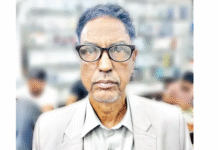From the frying pan into Saudi Arabia

Protect our migrant workers, don’t just ban them from going
We all know why people go to foreign countries, especially Middle Eastern countries, for work.
The prospect of a good wage, and the vague notion that somehow life will be better there can be hard to resist. Many don’t have the means or the educational background to do the research, so they are all the more susceptible to falling for ludicrous promises sold to them by unscrupulous middle-men.
So they put their faith, and their hard-earned money, where they shouldn’t, and end up paying dearly for it. For many, by the time they return, the lost time and money seem to be the least of their worries. The trauma is something they will have to live with for the rest of their lives.
Take the case of Kulsum Begum from Shariatpur, who left her one-year-old child at home to go to Saudi Arabia as a domestic worker. When recounting her experiences to this newspaper, she was in tears. Her Saudi employers, she claimed, “whipped me twice or thrice a day and sometimes poured boiling water on my body. They often applied electric shocks to my legs.”
Then there was Shamsun Nahar from Bhola, whose husband had passed away earlier. Her experiences were a bit different but no less horrifying: “I worked there for two months, my employers did not pay my wages. When I asked them to pay me, they beat me up and sent me to jail.”
Representatives of the KSA claim that nothing of the sort is happening over there, and that Bangladeshi workers are complaining simply because they cannot keep up with the demands. So are the experiences of Kulsum Begum and Shamsun Nahar anomalies? Are they making it all up?
Sadly, there is plenty of evidence that serious abuses are indeed happening, and that is why workers are coming back in droves. The claims of the Saudi representative reek of gas-lighting — that age-old tool used by people (men, really) with power to discredit claims of abuse by women.
No matter how detailed and specific the accounts, the response is always: She’s crazy, she’s lying, she doesn’t know what she’s talking about.
The whole situation is even worse when the women are — as is the case with most who go abroad for domestic work — poorly educated, financially strapped, and have never heard the term “gas-lighting” in their lives, so cannot understand or respond to the accusations made against them.
People with their hearts in the right place have raised a lot of noise about how a ban on female workers to Saudi Arabia is the only solution. But this ignores the issue of accountability, and lets all the shady middle-men and guilty parties off the hook, as though it is some kind of inevitability that women will be abused. It also subtly puts the blame on the women who have already been abused, as if to say: Why did you go to a country like that? What did you expect?
We have to do better, and that means protecting the rights of migrant workers, female or male, in all countries, not just Saudi Arabia. Most of these middle-men are as good as human traffickers, so they are the ones who should be subject to a ban, not workers.
The government can do this job. There is no reason for these unregulated, predatory agencies to even exist.
And finally, it is the solemn responsibility of the Bangladesh government to set up a mechanism to make sure further abuses do not happen.
There should be channels, through our high commissions and through other agencies, to monitor the situation and get our workers out as soon as there is some ludicrous violation like a Bangladeshi person being thrown in jail for no reason.
To only ban female workers from seeking opportunities there, under the pretext of protecting them, is sexist and backward thinking, and fails to address the broader problem of why a Bangladeshi citizen should be so powerless and vulnerable in the first place.
Women have the right to migrate for jobs, women have the right to try to dream of a better life, and yes, they have the right to be treated with a modicum of dignity. To simply accept these human rights violations as the way things are, while responding to them by further reducing the options for Bangladeshi women, is not progress. It is a great leap backwards.
Abak Hussain is Editor, Editorial and Op-Ed, Dhaka Tribune.









